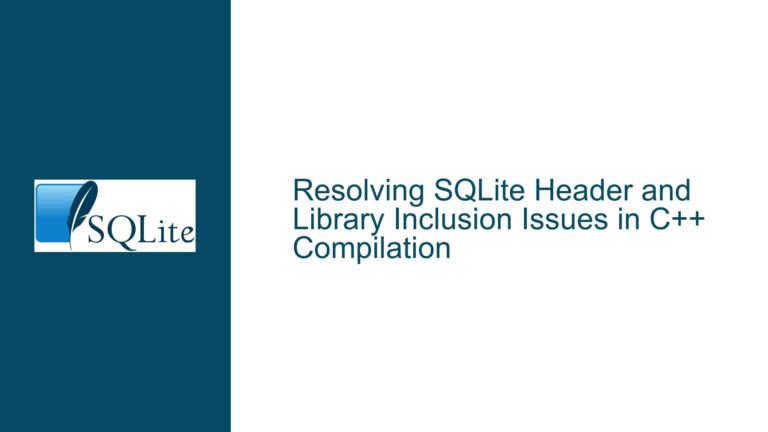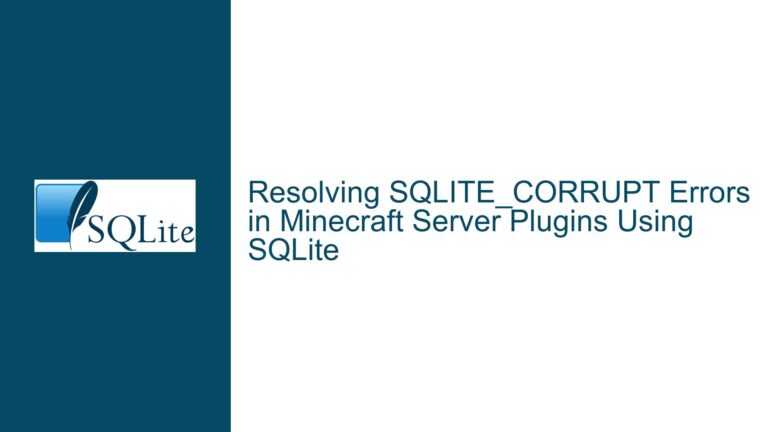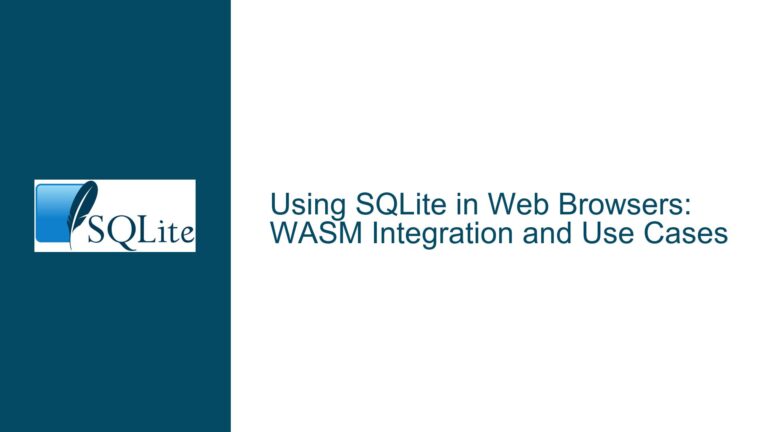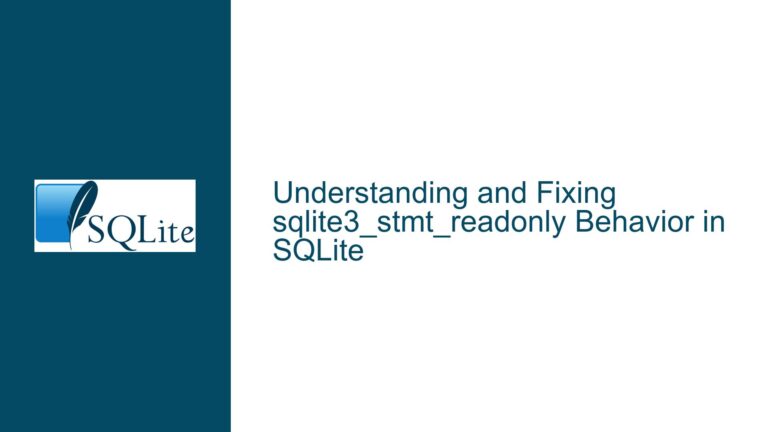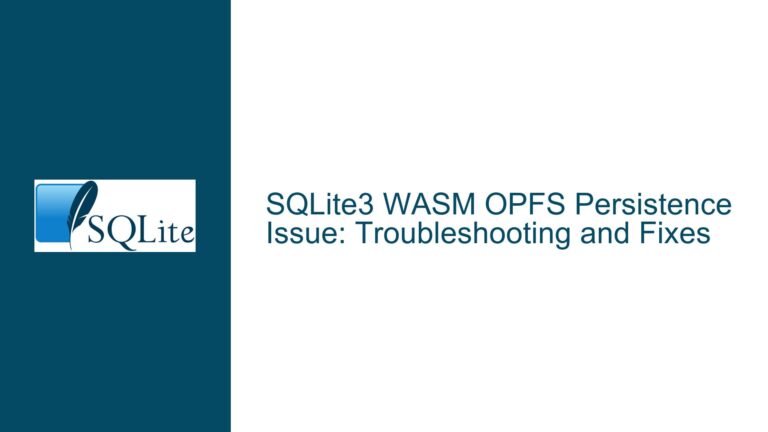SQLite Symbolic Link Handling Issue on z/OS: Analysis and Solutions
Issue Overview: SQLite’s Symbolic Link Resolution on z/OS
SQLite, a lightweight and widely-used database engine, employs symbolic link resolution to handle file paths dynamically. This feature is particularly useful in environments where symbolic links are used to manage file system structures. However, on z/OS, a mainframe operating system developed by IBM, this symbolic link resolution mechanism encounters a unique challenge. Specifically, z/OS resolves symbolic links in a way that SQLite cannot inherently handle, leading to operational issues.
The core of the problem lies in how z/OS processes symbolic links. On z/OS, a symbolic link might resolve to a path that includes a system-specific variable, such as $SYSNAME. For example, a symbolic link might resolve to $SYSNAME/var, where $SYSNAME is a placeholder for a system-specific value that z/OS resolves internally. Unlike environment variables in Unix-like systems, $SYSNAME is not an environment variable that SQLite can interpret or resolve. This discrepancy creates a situation where SQLite’s symbolic link resolution logic fails, as it cannot process or resolve the $SYSNAME placeholder.
This issue is particularly problematic because SQLite relies on symbolic link resolution for various operations, including database file access and path normalization. When SQLite encounters a symbolic link that resolves to a path containing $SYSNAME, it cannot proceed with the resolution, leading to potential errors or unexpected behavior. This behavior was introduced in a specific change to SQLite, as referenced in the commit d55273e36e312336b8fc77dc771657d3b2c3437fbbd79f3be37701982560d634, which altered how SQLite handles symbolic links.
The impact of this issue is significant for users running SQLite on z/OS. It can lead to failures in database operations, particularly those involving file access or path resolution. Given that z/OS is a critical platform for many enterprise applications, this issue can disrupt workflows and require workarounds or patches to maintain functionality.
Possible Causes: Why SQLite’s Symbolic Link Handling Fails on z/OS
The root cause of this issue lies in the fundamental differences between how z/OS and Unix-like systems handle symbolic links and path resolution. On Unix-like systems, symbolic links are resolved by the operating system, and the resolved path is typically a straightforward file system path. Environment variables, if present, are resolved by the shell or the application before the path is passed to the operating system. This allows SQLite to handle symbolic links effectively, as it receives a fully resolved path.
In contrast, z/OS introduces a layer of complexity with its handling of symbolic links. When a symbolic link on z/OS resolves to a path containing $SYSNAME, the operating system internally resolves $SYSNAME to a system-specific value. However, this resolution is not exposed to applications like SQLite in a way that allows them to interpret or process the placeholder. As a result, SQLite receives a path that it cannot resolve, leading to the observed issues.
Another contributing factor is the specific change in SQLite’s handling of symbolic links, as introduced in the commit d55273e36e312336b8fc77dc771657d3b2c3437fbbd79f3be37701982560d634. This change likely introduced stricter or more nuanced handling of symbolic links, which, while beneficial in most environments, inadvertently caused issues on z/OS due to its unique path resolution mechanism.
Additionally, the lack of direct access to z/OS by the SQLite development team complicates the issue. Without the ability to test and debug SQLite on z/OS, the development team cannot easily identify or resolve platform-specific issues. This limitation underscores the importance of community contributions, such as patches or detailed bug reports, to address platform-specific challenges.
Troubleshooting Steps, Solutions & Fixes: Addressing SQLite’s Symbolic Link Handling on z/OS
To address the issue of SQLite’s symbolic link handling on z/OS, several approaches can be considered. These range from immediate workarounds to long-term solutions that involve changes to SQLite’s codebase. Each approach has its own trade-offs and should be evaluated based on the specific requirements and constraints of the environment.
1. Disabling Symbolic Link Handling in SQLite:
One potential solution is to introduce an option to disable symbolic link handling in SQLite. This would allow users on z/OS to bypass the problematic symbolic link resolution logic entirely. Disabling symbolic link handling would mean that SQLite treats all paths as literal paths, without attempting to resolve symbolic links. While this approach would resolve the immediate issue, it comes with the trade-off of losing the benefits of symbolic link resolution, such as path normalization and flexibility in file system management.
Implementing this solution would require modifying SQLite’s codebase to introduce a new configuration option. This option could be set at runtime, allowing users to enable or disable symbolic link handling as needed. The implementation would involve adding a new flag to SQLite’s configuration settings and modifying the symbolic link resolution logic to respect this flag. Once implemented, users on z/OS could disable symbolic link handling to avoid the issues caused by $SYSNAME resolution.
2. Custom Symbolic Link Resolution Logic:
Another approach is to implement custom symbolic link resolution logic that is aware of z/OS’s unique path resolution mechanism. This would involve extending SQLite’s symbolic link handling to recognize and process $SYSNAME placeholders. When SQLite encounters a symbolic link that resolves to a path containing $SYSNAME, it would use z/OS-specific APIs or logic to resolve the placeholder to its actual value.
This solution would require a deeper understanding of z/OS’s path resolution mechanism and access to z/OS-specific APIs. The implementation would involve adding platform-specific code to SQLite, which would only be active when running on z/OS. This approach would preserve the benefits of symbolic link resolution while addressing the platform-specific challenges posed by z/OS.
3. Community Contributions and Patches:
Given the SQLite development team’s lack of access to z/OS, community contributions play a crucial role in addressing this issue. Users experiencing the problem can contribute patches or detailed bug reports that provide insights into the issue and propose solutions. These contributions can help the SQLite development team understand the problem and implement fixes that are compatible with z/OS.
To facilitate community contributions, users can submit patches that implement the proposed solutions, such as disabling symbolic link handling or adding custom resolution logic. These patches should be accompanied by detailed documentation and test cases that demonstrate the issue and validate the proposed fixes. The SQLite development team can then review and integrate these contributions into the main codebase, ensuring that the fixes are available to all users.
4. Collaboration with IBM:
Given that z/OS is an IBM product, collaboration with IBM can also help address this issue. Users experiencing the problem can raise tickets with IBM to highlight the issue and request enhancements or fixes to z/OS’s symbolic link resolution mechanism. IBM may be able to provide insights or solutions that can be integrated into SQLite to resolve the issue.
Additionally, IBM may be able to provide access to z/OS for the SQLite development team, enabling them to test and debug SQLite on the platform. This collaboration would help ensure that SQLite is fully compatible with z/OS and can handle its unique path resolution mechanism effectively.
5. Alternative Database Solutions:
In cases where the above solutions are not feasible or do not provide the desired results, users may consider alternative database solutions that are known to work well on z/OS. While SQLite is a powerful and lightweight database engine, other databases may offer better compatibility with z/OS’s unique features and constraints. Evaluating and migrating to an alternative database solution may be a viable option for users who require robust and reliable database functionality on z/OS.
In conclusion, the issue of SQLite’s symbolic link handling on z/OS stems from the platform’s unique path resolution mechanism, which SQLite cannot inherently handle. Addressing this issue requires a combination of immediate workarounds, such as disabling symbolic link handling, and long-term solutions, such as implementing custom resolution logic or collaborating with IBM. Community contributions and patches play a crucial role in resolving platform-specific issues, ensuring that SQLite remains a versatile and reliable database engine across diverse environments.

